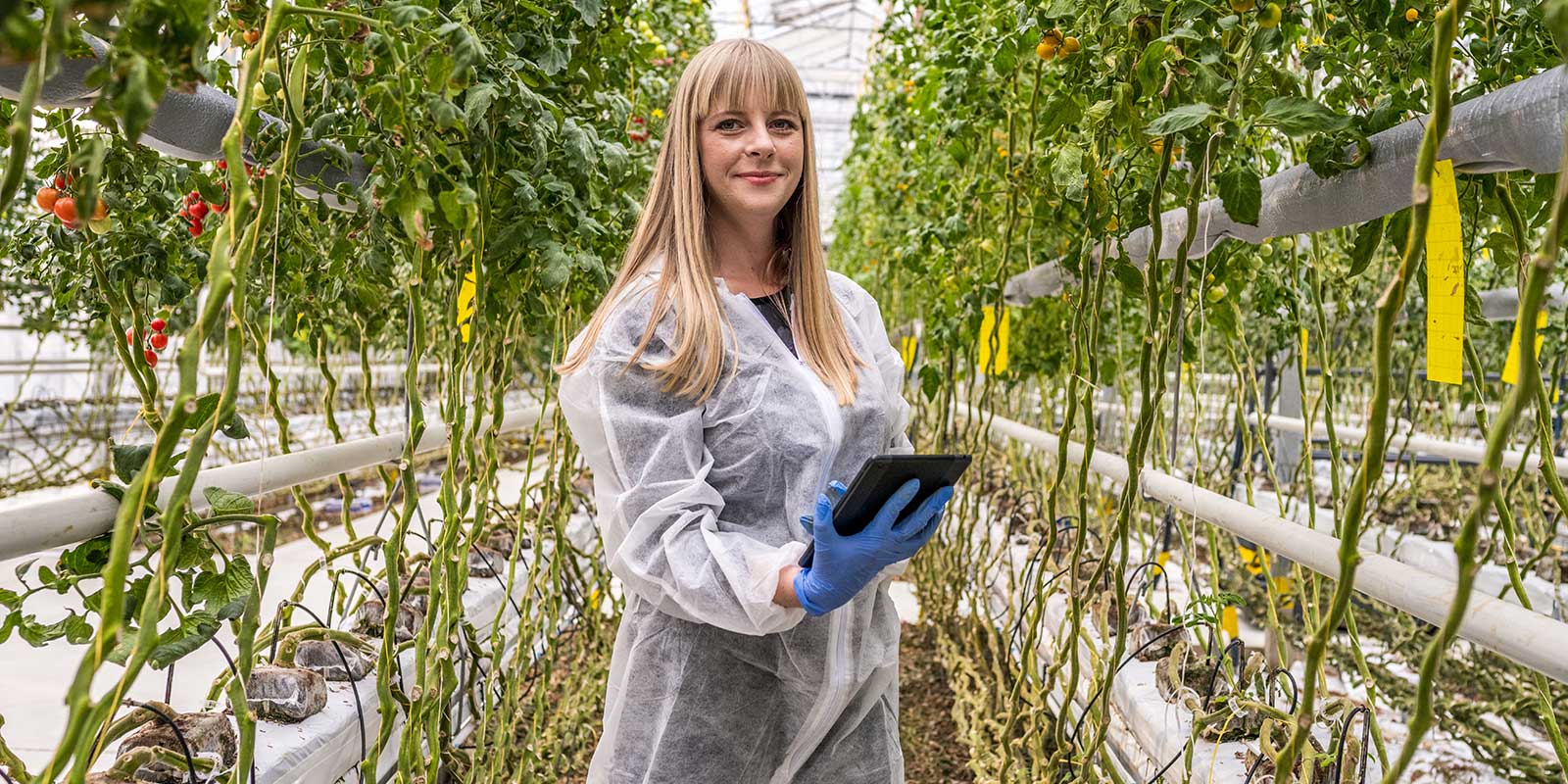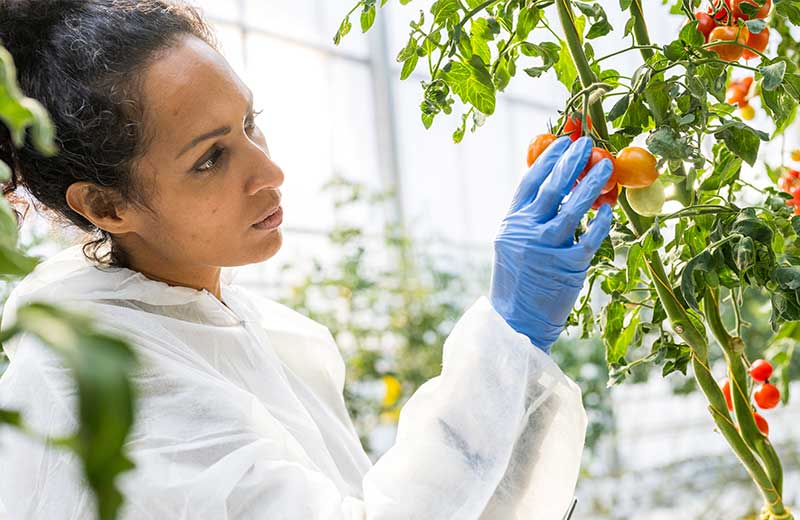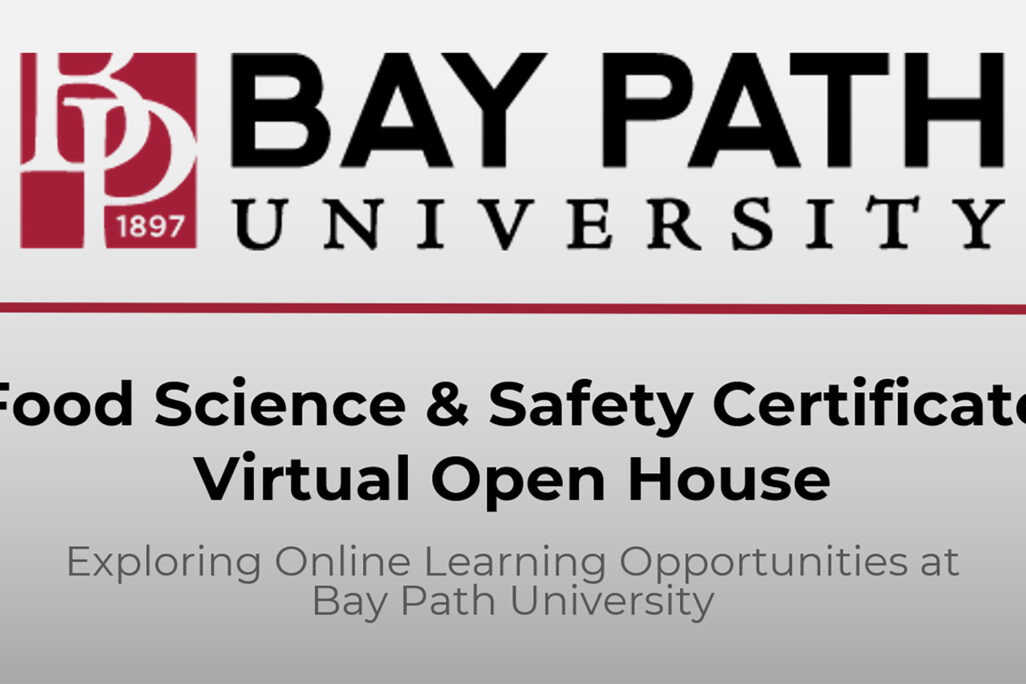Online Food Science and Safety Certificate

Study the Science of Food
100% Online
6-Week Courses
Industry-Led Learning
Accelerated Format
Request More Information
Complete this form to receive information about coursework, admissions, tuition, and more.
- Duration 16 months
- Cost per Credit $410
- Credit Hours 29
Program Benefits
- Accelerated coursework
- Full-time or part-time scheduling available
- Learn from faculty who are experts in food science, chemistry, microbiology, and more
- This certificate is financial aid eligible, with a 29+1 credit option available specifically for employees who are required to complete 30 credits
- The Certificate in Food Science and Safety is open to women and men
Advance Your Career in the Regulatory Food Industry
The online Certificate in Food Science and Safety from The American Women’s College of Bay Path University (TAWC) was designed for employees who require 30 science credits to advance in their careers according to federal agency guidelines. As one of the only programs of its kind in the country, this program delivers the training you need for supervisory positions in food safety and inspection.

Qualify for Management and Leadership Roles
TAWC’s online Food Science and Safety Certificate ensures you’re up to speed on the latest trends, regulations, and scientific developments in the food industry. Meet requirements for roles like food safety manager, which has an average salary of $70,716 per year.1 The knowledge and skills gained in this program can also open doors to entrepreneurship opportunities like your own food-related business.
Curriculum
8 Total Courses
16 Month Duration
Our curriculum emphasizes essential topics like foodborne diseases, food chemistry, food processing, and more. Throughout your program, you will complete a variety of lab experiences, including both physical lab kits and virtual simulations. The combination of theoretical and experiential learning will prepare you for continued career success.
Courses Highlights
Our curriculum emphasizes essential topics like foodborne diseases, food chemistry, food processing, and more. Throughout your program, you will complete a variety of lab experiences, including both physical lab kits and virtual simulations. The combination of theoretical and experiential learning will prepare you for continued career success.
Students examine the discipline and profession of food science in the United States in this introduction to the field. They explore concepts such as food production, food composition, food quality and deterioration, food preservations, food defense, and product development.
Students learn basic principles of microbiology applied to food manufacture. Laboratory exercises emphasize safety, quality control, and experimental approaches to food microbiology. Laboratory experiences required throughout the course. Please note that lab supplies required by this online course take time to order and ship. If you choose to enroll in this course, it is your responsibility to make sure that you follow up on lab related communications as needed in order to secure your lab supplies in a timely fashion. Adding this course to your schedule after the start of class may result in obtaining your lab supplies late.
Lab fee: $250 | Prerequisite: FSS 100 or permission of the program director
Students are introduced to the principal microbiological agents responsible for foodborne diseases. Student conduct laboratory experiments to recognize and classify these microbiological agents. Laboratory experiences required throughout the course. Please note that lab supplies required by this online course take time to order and ship. If you choose to enroll in this course, it is your responsibility to make sure that you follow up on lab related communications as needed in order to secure your lab supplies in a timely fashion. Adding this course to your schedule after the start of class may result in obtaining your lab supplies late.
Lab fee: $250 | Prerequisite: FSS 120 or permission of the program director
Students examine the biochemical, physical, and sensory properties of food components including proteins, lipids, carbohydrates, and pigments. Students conduct laboratory exercises that classify the chemical, physical, and biological changes in foods during processing and storage. Laboratory experiences required throughout the course. Please note that lab supplies required by this online course take time to order and ship. If you choose to enroll in this course, it is your responsibility to make sure that you follow up on lab related communications as needed in order to secure your lab supplies in a timely fashion. Adding this course to your schedule after the start of class may result in obtaining your lab supplies late.
Lab fee: $90 | Prerequisite: FSS 150 or permission of the program director
Students explore the impact of other food components such as minerals, vitamins, nutraceuticals, colors, flavors, direct food additives (e.g. preservatives, texture modifiers and stabilizers, colors, flavors), incidental food additives (e.g. processing aids, chemical toxins), intentional adulterants, allergens. In this course students design scientific experiments that enhance food quality and safety. Laboratories Required. Please note that lab supplies required by this online course take time to order and ship. If you choose to enroll in this course, it is your responsibility to make sure that you follow up on lab related communications as needed in order to secure your lab supplies in a timely fashion. Adding this course to your schedule after the start of class may result in obtaining your lab supplies late.
Lab fee: $105 | Prerequisite: FSS 220 or permission of the program director
Students explore the characteristics of food and are introduced to how it is preserved and processed. Students conduct experiments to reduce or accelerate spoilage and deterioration. Laboratory experiences required throughout the course.
Prerequisite: FSS 250 or permission of the program director
Students evaluate intentional and unintentional threats to the food system and review current approaches to reducing risk. Students assess the weakness and strengths of process flow diagrams in their semester long project.
Prerequisite: FSS 300 or permission of the program director
Students explore current topics in health and food safety and develop a personal and professional philosophy to guide their careers.
Prerequisite: FSS 320 or permission of the program director
Why Earn Your Certificate in Food Science and Safety Online?
With the online Certificate in Food Science and Safety, you can get an overview of the essential skill areas you need to qualify for advancement in just 16 months. Our 100% online course delivery enables you to learn from anywhere while continuing to work full time.
By Graduation, You’ll Have Skills to:
- Identify and describe the major chemical, microbiological, and nutritional concerns of food and the laws that address them
- Demonstrate appropriate laboratory procedures, including safety
- Identify and classify important beneficial microorganisms as well as pathogens and spoilage microorganisms in food
- Describe the chemistry underlying the properties and reactions of various food components
- Design and conduct experiments with food preservation, including low- and high-temperature processes, water activity, and other methods
- Create a personal and professional philosophy as a food professional
Admissions Requirements
Application Deadline 04/14/25
Start Date 04/27/25
Applicants will need the following to apply:
| A completed application |
| Official transcripts from your high school or all regionally accredited institutions you have attended |
Fee details
Cost per credit: $410
Total tuition: $11,890 plus lab fees
Learning with TAWC is an investment in your future, which is why we strive to provide industry-led programs at competitive rates. During the application process, a tuition planner can help you explore all available options for funding your studies.

Presenter 1: I’m happy to be here to highlight an example that Megan referred to earlier about how you can customize your learning experience at Bay Path. She highlighted already some of the certificates that we offer, the ones that are specifically housed in our business program. And here’s another example of a certificate that you could combine potentially with a BS in business or a BA in leadership and organizational studies to advance your goals in a new direction.
So the food science and safety certificate is a 29-credit certificate with an optional 30th credit if you are in need of a certain number of credits. It has no prerequisite science knowledge. And as I started to say earlier, there’s two paths. You can earn the certificate on its own as a standalone. It’s financial aid eligible, and both men and women may complete the certificate as is, the 29 or 30 credits.
You may also be interested in combining it with one of the bachelor’s degrees, and so I put some information there on the slide just to highlight the breadth of offerings that we have. Food science and safety is one example. If you are interested in the food industry and you’re interested in business, that might be a combination that appeals to you. But we do have extensive academic programs and a suite of certificates, so I just wanted to draw your attention to those resources.
You may be asking, what is food science and safety? You might have come here interested to learn about business and leadership and organizational studies and are not as familiar with this field. So this is an applied science, part of what I call the spectrum from agriculture, which is growing food, to nutrition and health, which is when we consume the food. And in between there is food science and safety, the creation of the food products we eat and ensuring that they’re safe for consumption.
It encompasses a range of knowledge and skills that you’ll learn through courses and laboratory experiences related to microbiology, chemistry, processing, the laws and regulations involved, and so forth. And if you think this sounds intriguing, this certificate really supports advancement in the food industry, such as the folks who help create policy and enforce policy or regulations around food, manufacturing settings where many of our foods are created, things like food quality, ensuring that the foods that are available in the grocery store or restaurant are of the highest quality. And then we’re always interested in food safety, making sure that what we put in our bodies isn’t going to inadvertently cause us harm.
Here’s a breakdown of the specific courses that are included in the food science and safety certificate. So you see that there’s a series of courses there. And some of them– I’ll call out one example, FSS 120 Food Microorganisms with Lab– include that lab experience that I mentioned before. And I just want to make a note that there could be a fee associated with the lab, and I’ll talk more about that in a minute.
The laboratory experiences– because this is an online certificate, so you’re taking all of your classes through our online classroom environment, and sometimes folks wonder, what do you mean by a lab in that kind of setting? Well, we have two main ways that you would experience a lab.
One is through a hands-on kit of supplies that we actually mail to you wherever you’re at, whatever you’re doing. So it may be your home, your office. If you’re traveling for work, we can send a kit to a hotel, whatever we need to do. You get actual physical supplies, as you see in the image there, and it contains everything you need to conduct the experiments or activities related to the lab.
The other tool that we use is the online virtual labs, which are conducted through your computer, kind of like a video game, and allow for a realistic virtual environment in which you will conduct a lab experiment and collect data and do analyses and so forth. And so I’m not going to use the time today to do it, but there is a short video linked there that you can watch, a demo of a lab simulation.
Presenter 2: Hello again. Similar to the how to apply that we discussed earlier, getting started really just takes those three steps. We’ll need a completed application and official transcripts from your high school or all regionally accredited institutions you’ve attended. You’ll be able to fill out the application. The page, again, is save as you go, so your progress won’t be lost if you’re interrupted or need to step away. You can submit transcripts via mail to the American Women’s College at 588 Longmeadow Street, Longmeadow, MA 01106 or by email to the Transcripts@Online.BayPath.edu.
Watch our Latest Virtual Open House
Hear directly from the Program Director to learn more about the online course format, program curriculum, career outcomes, admissions process, and more.
Frequently Asked Questions
Explore our frequently asked questions for in-depth answers. If you don’t find what you’re looking for, reach out to us.
You can easily start your application now.
Those who have completed the online Certificate in Food Science and Safety often pursue career titles such as food inspector and consumer safety inspector. Payscale listed the average annual salary for food safety managers as $70,716 in March 2023.
The online Certificate in Food Science and Safety provides a fast track to career success in the regulatory food industry. In just 16 months, you can obtain the academic credential to pursue supervisory roles in food safety and inspection.
This certificate was designed to meet the needs of employees who require 30 science credits to advance in their careers according to federal agency guidelines.
Source
- Payscale. “Average Food Safety Manager Salary.” Retrieved from https://www.payscale.com/research/US/Job=Food_Safety_Manager/Salary.